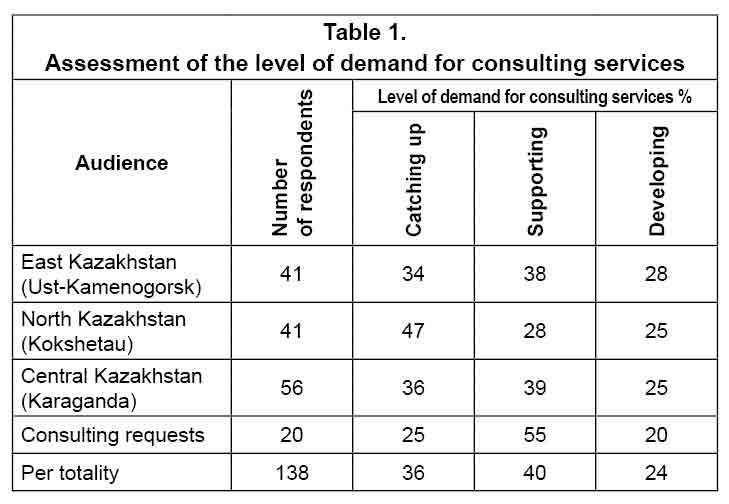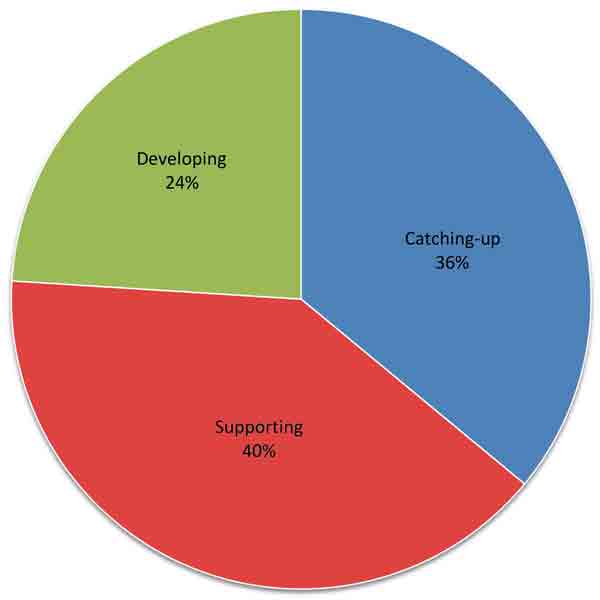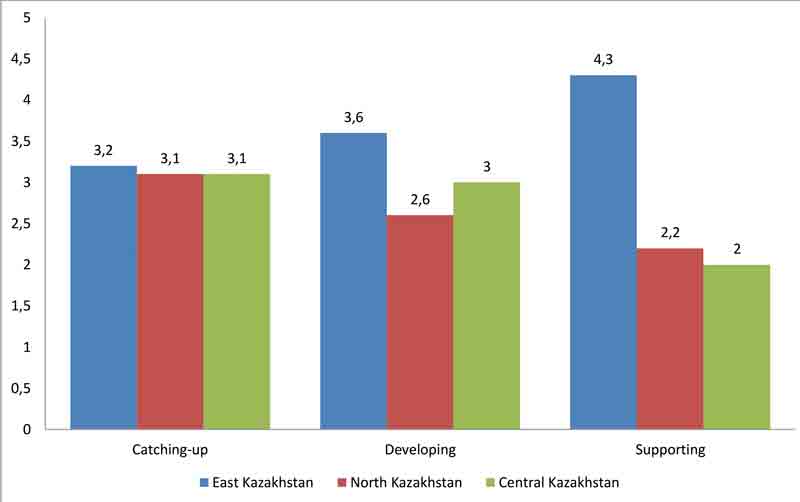The article presents the results of the study regarding the demand for consulting services and business education of entrepreneurs in Kazakhstan. Depending on the degree of temporary requirements for knowledge and actual marketing situation, the author classifies the educational demand into three levels: “catching-up”, “maintaining”, and “development”. The survey reveals that entrepreneurs of the three Kazakh regions display insufficient interest to invest in educational projects for the long term. The conservatism of thinking and an underestimation of the value of knowledge as a key business investment could induce new problems and inhibit the development of local entrepreneurship.
Assessment of Demand for Consulting Services and Business Education of Entrepreneurs in Kazakhstan
Today, when professional competences are rapidly becoming obsolete, making way to “the half-life of competence” within 4–5 years from the date of their acquisition, modern business persons are doomed to a life-long absorption of information during the whole of their lives. They’ve converted to novices being unable to accumulate and evaluate their own experiences with mistakes and achievements. Unfortunately, understanding of the value of certain knowledge comes after the fact, when people are faced with problems, gapping between the competencies that are required for the market activities and the level of knowledge and skills they possess.*
The European Bank for Reconstruction and Development (hereinafter EBRD) conducts with the government of Kazakhstan a joint program aimed at supporting and development of entrepreneurship. The program envisages the promotion of the system of domestic consulting business. “Fair consulting activities” were held in all regions of the Republic for the purpose of studying the problems that hinder the unfolding of Kazakhstan’s entrepreneurship and working out a program for the development of professional knowledge and competencies. Businessmen and experts took part in them. The author participates in these events as provider of training services and consulting. The participant observation was the main instrument to determine the demand for business education and to evaluate the need for business knowledge and competencies at various levels.
The subsidiary evaluation of questionnaires of entrepreneurs, obtained during the EBRD activities, highlighted three levels of exposure to the considered educational themes, depending on the level of development and efficiency of the business. The first level is aimed at brushing-up of knowledge and competences to solve the problems that emerged in the past.

A number of topical trainings were conducted during the sessions; they related to International Financial Reporting Standards (IFRS), staff management, creation of motivation systems, etc. The selection of trainings’ contents was necessitated by mistakes made earlier and focused on the approaches to rectify them. The author classifies such knowledge, educational products and demand for them as “catching up”, implying that their intake would help entrepreneurs to catch up with the current level of competitiveness.
The EBRD training sessions that could be identified as the second level included the following subject-matters: implementation of approbated 1C programs, Customer Relationship Management (CRM), quality management system ISO, optimization of production processes, etc. In this course, the entrepreneurs mastered the implementation of methods that have proved to be effective and are in demand in current educational market. Such knowledge, educational products, and the demand for them, the author has classified as “supporting”.
The third range of topics covered in the sessions of the EBRD, has been classified as “developing” or “foresight”. The development strategy, devised for the organization, the implementation of environmental management and auditing of energy efficiency are capable to generate long-term benefits for companies, strengthen their competitiveness in the future, and to channel business in a new direction. Such knowledge, educational products, and the demand for them has been classified after the secondary processing of the survey results as “educational or foresight”.
The author directly participated in the survey. Respondents substantiated our hypothesis about the low motivation of Kazakhstani entrepreneurs to care about important aspects of foresight education. Table 1 shows the assessment data regarding the demand for business education and consulting services, obtained after processing of the entrepreneurs’ responses in three regions of Kazakhstan, mentioned below.
The evaluated comments of the respondents coming from these three areas permit to outline some patterns characteristic of the Kazakhstan business as a whole. The results of the processing of responses of 138 entrepreneurs are illustrated by the structure of demand (figure 1). They feature the point prevalence of supporting consulting and educational demand. Figure 1 shows the graphical structure of the demand for educational and consulting services. It has been calculated according to the average indicators of the aggregate.

Figure 1. Structure of demand
for consulting services

Figure 2. Relevance of the estimates of demand for consulting services
The demand of entrepreneurs for consulting services can be described as conservative. The number of requests for workshops, consultations, knowledge acquisition and relevant products of business education is dominated by catch-up (36%) and supporting (40%) demand.
The developing demand averaged 24% with a small deviation. The low relevance of the demand for knowledge and techniques that can change business in the future, was the cause of permanent problems in the past and considerably aggravated the relevant situations. One may say that a “quench-a-fire business conduct” is still most prevalent among the Kazakhstan’s entrepreneurs.
In the survey, entrepreneurs rated their own needs for information and consulting services and benefits of receiving them according to a five-point academic grading system. This enabled us to assess the level of actual demand for catching up, supporting and developing educational products. Table 2 presents the assessment data at the end of the Consulting Fair in three regions of Kazakhstan. Relevance was assessed on a 5-point rating, where: 0 (no response) – the lowest score, 5 is the highest; number of respondents is the same.
Table 2. Scoring of the relevance of demand
| Region | Catching up | Supporting | Developing |
| East Kazakhstan (Ust-Kamenogorsk) | 3,2 | 3,6 | 4,3 |
| North Kazakhstan (Kokshetau) | 3,1 | 2,6 | 2,2 |
| Central Kazakhstan (Karaganda) | 3,1 | 3 | 2 |
| Average | 3,1 | 3,1 | 2,8 |
The ratings of catching up and supporting demands coincided at the end of the Consulting Fair.
The average rating of 3.1 on a 5-point scale indicates the degree of relevance that is slightly above the average (62% of maximum relevance). The entrepreneurs assess their need for knowledge to past and present issues as significant, but not vital.
Figure 2 shows that the evaluation of the educational demand in Eastern Kazakhstan got a big score than in two other regions. Due to the specific circumstances in the region with an advanced industrial capacity (there are such large companies as Kazzinc and Ulba metallurgical plant, manufacturing industry is 41%),1 more demand was generated for a foresight education. However, the results of the previous evaluation do not permit to confirm this assumption. The author will further explore the relevance of the demand for materials during the Fair of Consulting in other regions and in order to obtain broader base of comparable facts. Then it will be possible to reliably estimate the rating of 4.3 that has been obtained in Ust-Kamenogorsk manifested as regularity or statistical error.
Summarizing the results of the study of the demand for consulting services and business education of entrepreneurs in Kazakhstan it is possible to draw the following conclusions.
Mindset of entrepreneurs in our country remains to a great extent conservative;
The role of knowledge, services and products of business education and consulting as potential tools for business development is at the average level of mainstreaming;
The demand is primarily focused on the tools and methods that could solve urgent problems that have been caused by mistakes committed in the past;
The acquisition of knowledge as a valuable investment in the future has not as yet been perceived by the Kazakh business community.
This leads to a further multiplication of problems, hampers the business development and specifies demand for consulting services and business education. It is necessary to wider investigate the mechanisms that regulate the demand for specific educational programs, to develop an impactful model of foresight marketing, and to promote services and know-how that in the long run would encourage the business activities in Kazakhstan.
Tatyana Khassanova
Graduate of Department of Marketing Communications
Institute of Economics, Trade and Technology, South Ural University,
Lenina Str, 76, Chelyabinsk, 454080, Russia
Notes
1. KAZDATA. Marketing Handbook. [electronic resource] http://kazdata.kz/04/2015-kazakhstan-east-oblast-305-310-311.html date of access 03.05.2017




